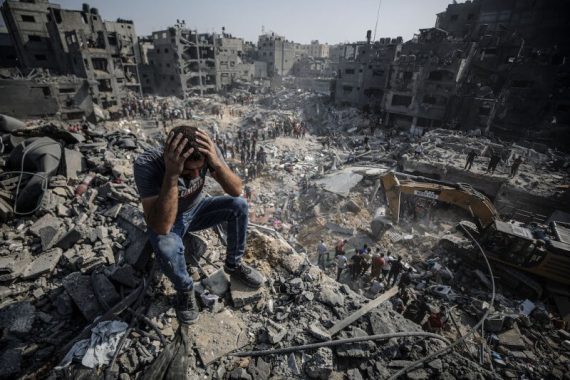T
he latest eruption of violence in the Middle East has shifted the balance in the Palestinian-Israeli conflict. Seeing the striking and deterrent power of Palestinian actors, the Israeli government responded with a recklessly violent and disproportionate response in violation of human rights and the principles of international law. Realizing that this all-out attack will not solve the problem, Israel will soon have to accept the existence of a “counterparty.”
Hamas’s Operation Al-Aqsa Flood against Israel on October 7 was a big surprise in many respects and, at the same time, an important breaking point in the context of both the Palestinian-Israeli conflict and regional developments. This article will begin by a brief look of the Hamas attack and how it took place before moving on to a discussion of the effects of the attack on the Palestinian-Israeli conflict. The possible effects of these developments on Palestine, and on regional and global politics will then be examined.
Operation Al-Aqsa Flood
The Hamas attack against Israel is not the event that started the latest series of developments. According to United Nations resolutions and principles of international law, the Gaza Strip, which Hamas governs, is Palestinian territory that has been under Israeli occupation since 1967. However, it has been subjected to direct and indirect Israeli attacks continuously since 2006. Israel has cut off all air, sea, and land connections to Gaza, including destroying the Gaza International Airport in 2000, isolating Gaza from the world. By preventing the movement of people and goods, it has turned the region into an open-air prison.
For a long time, the Israeli government has been punishing the people of Gaza with severe sanctions, waging a comprehensive and systematic war of attrition against the Palestinian people, in general, and the people of Gaza, in particular. Particularly in the period following the Arab uprisings and revolutions, it has developed more unilateral policies towards Palestinians and their territories. With the collapse of the relatively stronger regimes that were the bearers of Arab nationalism, the “Palestinian cause” lost its meaning and importance in the Arab world. Israel was, thus, experiencing one of the most comfortable periods in its history.
However, far from seizing the opportunities that emerged during this period, the Israeli leadership exploited the power vacuum and made the Palestinian-Israeli conflict even more intractable. With the support of the U.S. government, it imposed the conditions it wanted on the states in the region and normalized relations with those that complied with its conditions.
The so-called deal of the century, developed under the auspices of the U.S., especially during the Trump administration, and the Abraham Accords, signed with a number of Arab states, are important developments in this unilateral process. Naturally, they were not the result of real negotiations with the other side, but remained half-finished unilateral projects representing the interests of Israel and the United States.
The recent power vacuum, the influx of invaders from other parts of the world who were brought to Palestine and settled in Palestinian homes and lands, the daily loss of Palestinian lives and land, the intensifying human rights violations, and the oppression of the Palestinian people led to the “explosion” of October 7. In other words, the full-swing continuation and escalation of Israel’s policies of dehumanization, confiscation of land, and statelessness towards the Palestinian people can be cited as the main reasons for Hamas’s latest attack. All these local and regional developments have deeply shaken the balance of power in the Middle East.
A brief analysis of Hamas’s attacks on October 7 and Israel’s disproportionate response to this attack is now possible. Such a large-scale attack can only be the product of long-term planning and strategy. It, thus, seems that Hamas had been working on the attack for a long time.
It is also important to underline that Hamas is not an Iranian proxy organization. In fact, Hamas and Iran diverged on many issues during the Arab uprisings and revolutions. Especially after Iran and its proxies targeted and killed innocent Sunni Muslims in Syria, Yemen, and Iraq, Hamas grew cold and distant from Iran. Yet, when Israel emerges as a common enemy, they can find common ground. All in all, Hamas, a Sunni and Arab actor with a Muslim Brotherhood background, has independent interests and goals, and receives help from Iran—but not instructions.
Second, it seems that Israel, for different reasons, underestimated the power of Hamas. In Israel’s thinking, in the post-Arab revolts period, there were no Arab states left to help the Palestinians, and almost all actors and movements in the Arab world committed to the Palestinian cause were suppressed by Arab regimes. In addition, the Israeli government had built a high security wall around the whole of Gaza, isolating it from the world. The latest attack showed that Israel miscalculated Hamas’s power.
Third, Al-Aqsa Flood was the largest and most effective attack waged by Palestinians against Israel in history. Demonstrating the strength and deterrence of Hamas and other Palestinian actors, this attack shattered the myth of Israel’s invincibility and invulnerability, and inflicted the greatest military, political, and psychological damage on Israel in its history.
Fourth, with the latest attack, it became clear that the unilateral steps taken by Israel and the United States, together and separately, will not solve the problems in the Palestinian territories. Both the U.S. and Israel have learned that they must also take into account the concerns and expectations of the “other side.” For example, the U.S. declaration of Jerusalem as Israel’s capital and it recognizing Israel’s decision to annex the Golan Heights, the Syrian territory occupied by Israel since 1967, is contrary to the relevant UN resolutions, international norms, and principles of international law. Both countries violate the basic principles of international law and alienate the vast majority of the international community.
Regional and global implications of the Gaza war
One of the immediate effects of deterrence will without a doubt be an expected reduction in Jewish immigration to the Palestinian territories.
Second, the Israeli counterattacks in the aftermath of the Hamas attack disrupted the normalization process in the Middle East. The governments of the Arab states cannot remain indifferent to the anti-Israel sentiment in the Arab streets. If they do not take the necessary measures, which they probably will not, the Arab peoples will put pressure on their governments to end the normalization process.
Meanwhile, Western states’ unconditional support for Israel shows that they are uncomfortable with the normalization process in the region. The Western states which have been trying to control all developments in the region for the last 150 years, do not want the regional states to pursue independent politics and are opposed to the success of moves for political stability and economic development in the region. This is because as long as political turmoil and poverty continue in the Middle East, the countries of the region will remain dependent on them.
Third, Israel’s reckless attacks on the Palestinian people and the values and symbols of Islam and humanity have united all Muslim sectors and, albeit temporarily, removed the Sunni-Shia tension. For example, the Saudi and Iranian ministers who attended the Organization of Islamic Cooperation meeting convened in response to Israel’s mass killings, discussed the issue among themselves, and tried to take a common stance. In the aftermath of the Arab revolts and revolutions, the Sunni-Shiite conflict, which had been so sharp in the process, was relegated to the background, especially in the face of attacks on the Al-Aqsa Mosque and the Muslim Palestinian people.
Recommended
Fourth, the recent Israeli attacks have sharply divided world public opinion into different camps. In the face of these developments, almost all Western states have declared their biased stance by telling Israel that it is not alone and that they stand by it unconditionally. Conversely, almost all non-Western countries, except India, have made more balanced and neutral statements, calling for Israel to withdraw from the occupied territories. The Palestinian-Israeli conflict is one of the most important issues exacerbating the tensions between the West and the non-West, which have become quite pronounced in recent times. At this rate, Israel’s expansionist and disproportionate policies of violence and human rights violations will increasingly impose costs on Western states.
From the first hours of the Hamas attack, Western states issued statements of support for Israel, expressing their readiness to mobilize their military, political, economic, academic, and media capabilities. No major Western state such as the U.S., the UK, France, or Germany has held the Israeli government responsible for the mass killings of Palestinians. However, Israel and its Western backers, which constantly want to target Hamas, know very well that Israel’s violence against Palestinians did not start with Hamas. For nearly a century, the West has stood behind Israel’s unilateral and oppressive policies that have victimized the Palestinians in every way. In other words, in addition to Israel, Western states are equally responsible for all the atrocities that Palestinians suffer from today onwards.
Fifth, as a result of their unconditional support for Israel, to a greater or lesser extent Western states will pay for Israel’s crimes in the Palestinian territories. To start off with, the West has lost much of its moral discursive superiority over the rest of the world. As long as the West continues to support Israel, which refuses to behave like a normal state, it cannot invoke universal moral values, international norms, and principles of international law against anyone.
Moreover, the contradictions between the West’s political rhetoric and its policies on the ground show that it is an unreliable power, and non-Western states do not want to follow Western policies anymore. For example, the majority of the world failed to unite in the Russia-Ukraine war. The states that oppose the occupation in Ukraine but do not speak out against the occupation in Palestine no longer carry much weight in the eyes of many actors. Currently, everyone appreciates that states’ different positions on the two conflicts are the result of different interests.
Sixth, Western states’ support for the massacres of Palestinians, both Muslim and Christian, such as the Al-Aqsa Mosque will only increase anti-Western sentiment in Muslim countries. With the increase in the deterrent power of Muslim countries and the rise of non-Western powers in the international balance of power, the cost of anti-Westernism to the West will only increase. After these recent developments, the United States, which was thought to have withdrawn from the Middle East, has been drawn back into the region by Israel. The diversion of American warships to the region means that the Middle East is the primary source of global threat for the U.S.
Seventh and last, considering the unconditional Western support for Israel and the rising Islamophobia in the West, Israel has engaged the West in a “war of attrition” with Muslim states and peoples. It seems that this will be a lose-lose situation that will increase the so-called clash of civilizations. In the new era, countries will no longer accept Western states as mediators in regional crises. For example, the recent Azerbaijan-Armenia peace talks in Granada, Spain, could not take place because Azerbaijan refused to accept France’s mediating role. Or, when China, rather than a Western state, mediated between Iran and Saudi Arabia, two of the most influential states in the Middle East.
In conclusion, as long as Israel’s disproportionate use of force and oppressive policies against Palestinians continue, neither can Middle East politics be normalized nor can the deadlock in the international system be eliminated. For international norms, the decisions of international institutions, and the principles of international law to be effective, Israel’s unilateral and aggressive policies must be abandoned and the West must take back the blank check it has given Israel.





